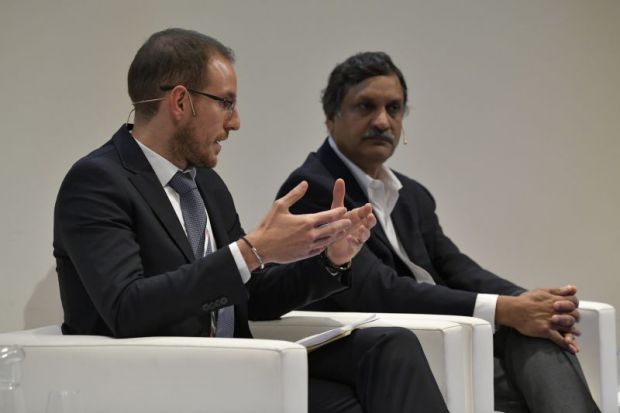University students must be taught “how to fail” to prepare them for higher education – and for life, a Fields Medal-winning mathematician has argued.
Speaking at Times Higher Education’s World Academic Summit at ETH Zurich, Alessio Figalli, who won mathematics’ version of the Nobel Prize in 2018 for his work on probability and differential equations, said he wanted students to learn that “we will fail in life”.
“When I do mathematics, 90 per cent of the time I will fail,” said Professor Figalli, who was made chair of mathematics at ETH Zurich in 2016, having previously been made a full professor at the University of Texas at Austin at the age of 27.
“These are skills we need to learn, and students should learn how to live with this,” he said.
Professor Figalli said European universities were better at asking students to learn from their mistakes than American institutions, as mathematics undergraduates are generally required to undertake a research project that would inevitably test the limit of their abilities.
“You have to do a BA thesis, where you have to write a 30-page thesis and students will try to learn a certain theorem,” said Professor Figalli, an Italian who took his PhD at the École Normale Supérieure de Lyon under Cedric Villani, also a Fields Medallist, who is now French president Emmanuel Macron’s adviser on artificial intelligence.
While most students approach their professors for help with these projects, this was useful as it illustrated the testing and unknowable nature of research, Professor Figalli said.
“Every time you want to do research, you need to be creative – you do not know what you are doing and it takes a lot of time,” said Professor Figalli.
While the rules of mathematics appeared fixed and unquestionable early on at undergraduate level, students should be encouraged to question the rules once they reached a certain competency – a stepping stone towards the world of research, he said.
It was similar to “seeing a painting that is completed [where] every detail looks super-perfect”, where “someone has already made that journey”, said Professor Figalli.
“When you do research, you have to create it yourself,” he explained.
In response, Eng Chye Tan, president of the National University of Singapore, said more students at his institution were experiencing failure within their degrees as they were required to do research projects at undergraduate level, a change modelled on the Massachusetts Institute of Technology, where “100 per cent [of undergraduates] will do a research project under the supervision of a professor”.
“No one will hit the jackpot straight away unless they are a super-genius or their project is too simple,” observed Professor Tan, who observed that “70 to 80 per cent of course content could now be found online”, so it was now more important than ever to provide undergraduates with such experiential learning.
Register to continue
Why register?
- Registration is free and only takes a moment
- Once registered, you can read 3 articles a month
- Sign up for our newsletter
Subscribe
Or subscribe for unlimited access to:
- Unlimited access to news, views, insights & reviews
- Digital editions
- Digital access to THE’s university and college rankings analysis
Already registered or a current subscriber? Login








